The ability to live off the land could mean the difference between life and death. For thousands of years, our forebears managed to thrive off the bounty of nature, and there is no reason why you cannot.
All you need is a little bit of knowledge and the willingness to get blood on your hands. Nature will supply the rest.
This article will deal with field dressing a rabbit. Typically this would take place out in the woods or wherever the hunt took place, but on the evening I hunted this rabbit, it was pouring rain, so I prepared it inside.
The steps and the basic idea remains the same. If relevant, I will mention some differences to keep in mind when working in the field versus on a table.
Equipment
First of all, I want to mention two tips concerning processing any animal you harvested.
Firstly: Hunting knives are great, but when working with small game, a small sharp knife will work much easier. A folding knife works well, but always accumulates hair and blood inside, so be sure to clean it well afterward.
Secondly: I never process animals without a sturdy pair of scissors and also a small saw. Knives are great for cutting meat, but scissors sometimes provide greater control for cutting off tails or limbs, particularly when field dressing. Small saws allow you to easily cut through strong pelvic and chest bones in medium-sized animals.
Have some bags handy to put the processed meat into. It keeps the dirt off, but even more importantly, contains the blood and fluids the carcass loses. You will likely wash your meat later, but without bags, you will need to was your backpack as well.
General Remarks on Rabbits and Hares
The first thing to know is that their skin is much softer than you imagine. It’s also very loose around the body and upper parts of the limbs. The skin on the lower limbs is so tight, it’s not worth the effort to try and remove.
You will see when pulling the pelt off, it will naturally tear at the lower limbs. The part of the lower limbs with skin on is cut off with the scissors in totality and left for scavengers.
Check the liver and intestines for signs of diseases or parasites. Even though you are not trained, sometimes a major problem will be obvious. I don’t eat anything I cant trust.
IMPORTANT: White spots on the liver could be signs of tularemia. Immediately discard the rabbit and wash your hands with soapy water. DO NOT EAT!
Related: How to Make a Natural Remedy for Food Poisoning
Field Dressing
Field dressing typically refers to the removal of the organs of hunted animals. Large animals present challenges when it comes to removing the skin or processing the animal in the, because of their size and weight. For smaller animals, this is not a problem.
You can remove the organs only and process the animal later, or process it entirely and just cook later.
I am going to start with the removal of the skin, but you can skip that part if you want to leave the skin on and remove it later.
Pelt Removal
The best way to remove a rabbit or hare’s skin is to grab ahold of the pelt just behind the neck, and using your knife or scissors, cut a notch into it.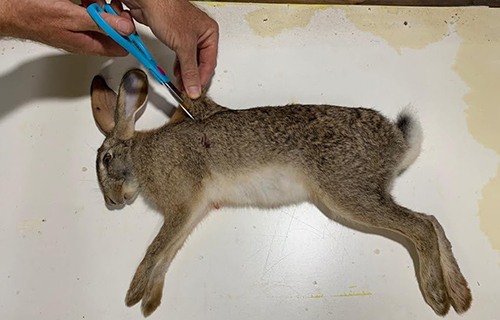 Insert your fingers into the hole and pry it open.
Insert your fingers into the hole and pry it open.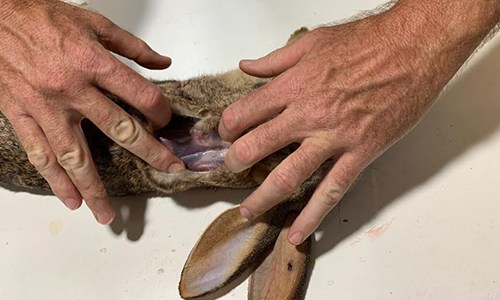
Stretch the hole until you can get a few fingers into it, and then peel the entire skin back toward the tail in one smooth movement.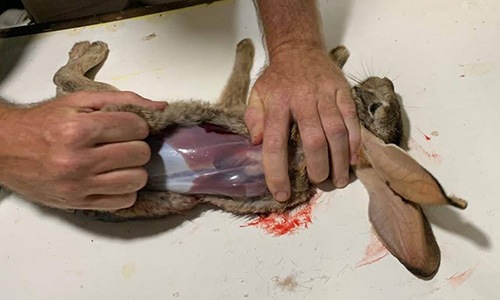
I still recall the first time I did this. I was surprised at how easy the skin tears, and also how pulling the skin off was almost like pulling off a pair of pants.
The entire pelt just slips of the rabbit. It will stop once you get to the lower extremities, but just pull hard and tear it off.
Repeat the process for the skin on the torso and shoulders, pulling it off toward the head.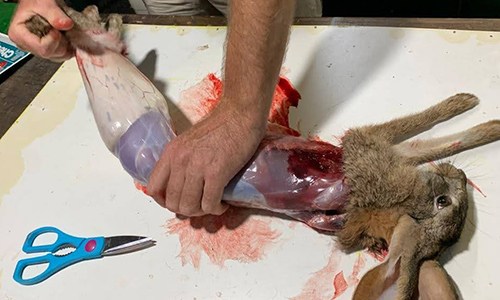
Skinn will remain on the extremities of the limbs, the head, and the tail.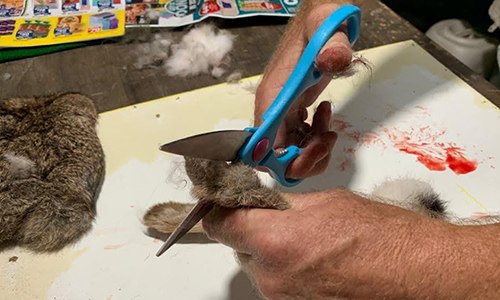
Use your scissors and knife to remove the tail, extremities of the limbs and also cut off the head. I cut close to the head, but you can remove the neck and head if you prefer.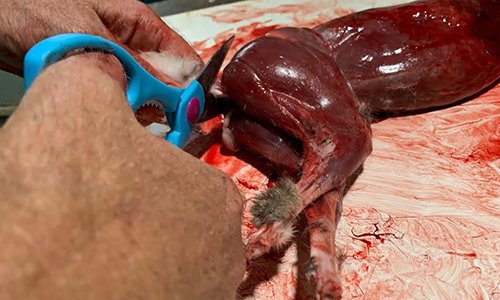
Next, you need to open the intestinal cavity to remove the organs. Cut a small notch just below the chest bone, and then cut toward the pelvis.
Because plants have low nutritional density, herbivores always have a lot of intestines that are filled with partially digested plants. Be sure not to cut or puncture intestines.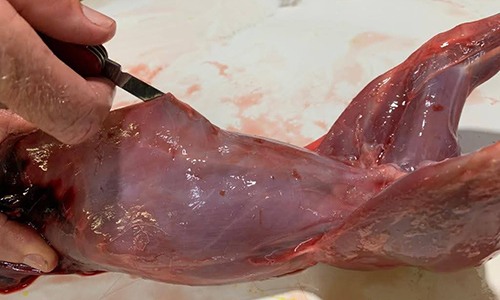
When you get to the pelvis, you will notice that the colon passes through a hole in the pelvis. You can cut through the pelvic bone and cut out the entire anus.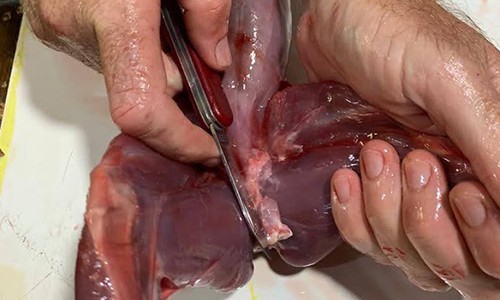
I don’t go that far. I pry the organs out of the chest cavity, and once I have all the organs outside of the rabbit, I just cut the colon where it terminates. Cut as close to the skin as possible.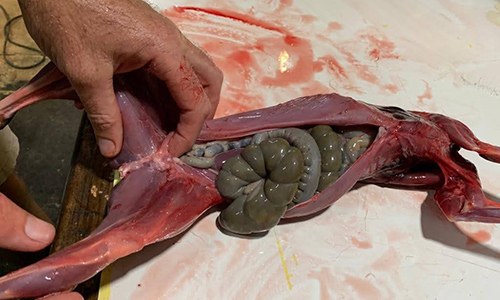
At this stage the organs will all be outside, intact, and in one small heap. I recommend just drawing them apart to inspect.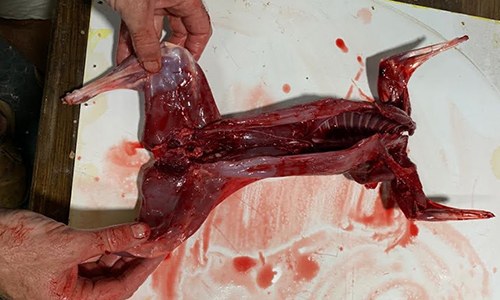
White spots on the liver may be signs of tularemia. DONT EAT ANY PART OF THE ANIMAL. If the rabbit has tularemia, discard everything.
Most of the meat on a rabbit is in its lower extremities. It has well-developed thighs and fillets on the lower back. The torso, including the chest shoulder, and upper arms also have meat, but not that much.
I cut the thighs individually. I cut the fillets and lower back in one portion, and I let the upper body remain intact. You can portion this according to your preference.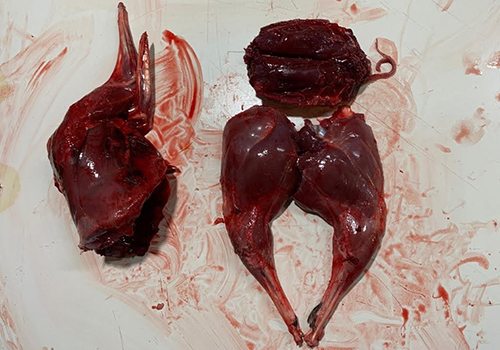
If you want to cook rotisserie style on a skewer above a fire, leave the carcass intact.
Related: The Lost Art of Scratch Cooking
The only organs I eat from a rabbit is the liver and the heart.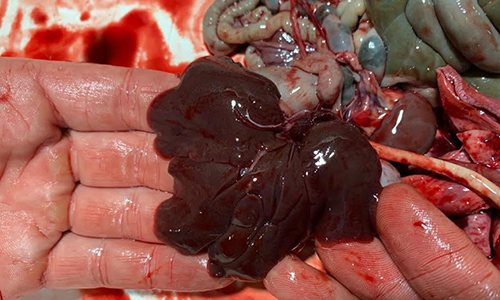
Field Dressing
In the preceding section, I started with removing the skin. You could leave the skin onto remove at a later stage, but in all herbivores, I would remove at least all the intestines as soon as possible.
Fermenting vegetation in the intestines starts producing gas real fast. This could lead to bloating or the colon being evacuated at an inopportune moment, resulting in poop being blasted onto surfaces that you would rather keep clean.
When field dressing, you could also leave the carcass in one piece. If you intend to cook your rabbit in a pot, like a stew, you can quarter it now or later.
If you want to cook the rabbit rotisserie style, leave it in one piece. It’s after all your meat, and you can do with it as you please.
Enjoy
Animals that grow up wild have less fat and darker meat than domesticated or cage-raised animals. Higher protein means more nutrition and also feeling satiated for longer.
Cook and enjoy. As with all venison, cook it well to ensure all parasites are neutralized. Bon Apetit!
You may also like:
How to Keep a Slaughtered Animal From Spoiling by Eating it in the Right Order
This Strange Method Will Make Your Food Last For 2 Year Without Refrigeration (Video)

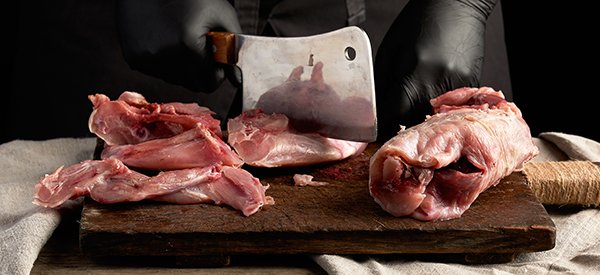
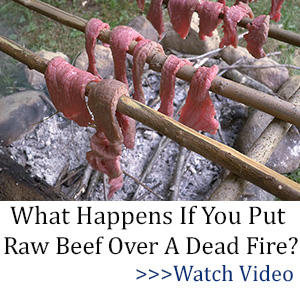




















Tularemia or rabbit fever as it called in my neck of the woods is no joke. It can be quite debilitating. If at all possible I recommend wearing gloves when cleaning rodents of any kind.
Latex without any kind of powder, easily washed as you go keeping tools free of contamination. Just makes sense.
Rabbits are not rodents. They are lagomorphs, but yes always where disposal gloves when dressing. Tularemia is very serious and can be fatal.
Absolutely agree about gloves. A pair or two of nitrile gloves weigh next to nothing. In addition gloves are easier to clean than your hands with all the cracks and crevices on your fingers.
I find a pair of poultry shears works better than scissors for cutting through bones and snippng the skin. Lacking poultry shears, a pair of by-pass hand trimmers for gardening work almost as well as poultry shears. By-pass trimmers and poultry shears are stronger and can cut through bone joints more easily than household scissors in my opinion.
Claude: Like the new format. The only criticism I have is that using black typeface for the comments is easier on the eyes for us more mature followers of this list than the gray typeface presently being used. I don’t know why websites use gray typeface. Yours is large enough to be legible some use 6 point type and that is at the barely legible, straining to make out some letters size unless you are twenty or have a new prescription in your reading glasses.
Claude and LCC,
Not liking the new format for different reasons. your new webpage coding now completely prevents any copying of your article (right mouse click, print to pdf), Which used to be real nice because all the comments could be captured, and all those other great ideas could be preserved in my file. Now, not.
Ok, now eating crow and taking my last comment back. Seems my right mouseclick print is now working really cleanly. highly recommend. Thanks.
Hi,
Thank you so much for providing us with feedback for our new Ask A Prepper website.
Every such suggestion from our readers is valuable to us, as the website is still being implemented and more changes will follow.
We are working hard to shape it into its final version that will be faster, more intuitive and more practical than the older one.
With your continued help that goal will be reached faster, so that you may enjoy the wealth of survival knowledge it brings and learn something new every day.
God Bless,
Claude
Since the rabbit is explicitly forbidden by the Lord God in the Holy Scriptures, I won’t be eating rabbit to survive. Rules don’t apply only when its convenient and easy to follow. If it comes down to survival, that is when you must take out your most important tool: faith. Jesus said,
“What man is there among you whom, if his son ask you for bread, will you give him a stone?! Or if he ask a fish, will you give him a serpent?! If ye then, being evil, know how to give good gifts unto your children, how much more shall your Father which is in heaven give good things to them that ask Him?”
Remember Elijah the prophet, when he fled into the wilderness to escape the murderous Queen Jezebel; because of his faithfulness our Heavenly Father gave him a river of pure flowing water and sent ravens to bring him fish from the sea!
And the Hebrews in the wilderness, God sent them quail and a river of water from a rock!
You do your job by being obedient, and trust the Lord to keep His promises to bring you that which you need. There is but one stipulation: Love the Lord your God with all of your being AND love your neighbor as yourself (ALL of your neighbors, whether they are good or bad, Black or White or Asian or Mexican, Straight or Gay, male or female, rich or poor, friend or enemy, Christian or Catholic or Hebrew or Muslim or Pagan or Atheist or Buddhist, or Democrat or Republican remembering that God made mankind in HIS image and “made of ONE BLOOD all tribes of Man for to dwell on ALL the face of the earth”).
Do you need food and water and protection and medicine and cannot procure it lawfully: “Seek ye first the Kingdom of God and ALL of these things will be added unto you”.
“Be ye wise as a serpent but HARMLESS AS DOVES”.
Whoa….. GOD gave Peter a vision and All meat is clean! I agree with most of your words except NEVER EVER, can I love a democrat…….!!
Well, Martin, “never ever” is pretty limiting. I try to eschew the use of the words “never” and “always” because they are so encompassing allowing no wiggle room at all.
I can think of several democrats whom I believe led honorable lives. I might not have agreed with their politics but I personally think they were men of integrity. Two that come to mind immediately are Harry S. Truman and Hubert H. Humphrey. I didn’t agree with their politics but I do admire them as public figures. That’s a fairly limited list but it certainly takes it out of the “Never ever” category. I could probably think of some more democrats whom I admire but don’t feel terribly motivated to cogitate the matter further.
“I’m never shopping their website again.” is very exclusive. “They are so low on my list of preferred vendors that I most likely will not select them for anything I need in the future,” leaves a little wiggle room and precludes having to eat crow which I understand is not very tasty.
LCC: Gotta agree with Martin on this. If the repub is no good, we don’t vote. If the place or site is against us, why would we want to support them?
Martin: Agreed. niio
You’re confusing OT with NT. Think of it as God’s “new will” for His children, and remember what Jesus said, “It’s not what goes into your mouth that makes you unclean, but what comes out.”
Wise words that I need to be reminded of. But not many others will appreciate. That’s ok – they’re doing their best too. A thumbs up from me.
Good advice. I add, after cutting the first notch, run a small hose in it between meat and skin and slowly fill with cold water. Skin on a fresh carcass will separate from the meat. If the carcass is older, often the skin starts to dry and sticks to the meat. niio
I kill the home rabbits by quickly cutting off the head with a hatchet and hammer, then I cut off the front feet. I next cut off the front feet -again using the hatchet and hammer. Hang the rabbit by the hing feet to bleed out better. Cut off the tail with a small very sharp knife or poultry siscors. They loosen the anal opening with the small knife. Lay the rabbit on a butcher block and cut off the hung feet with the hatchet and hammer. Now I slip off the rest of the skin from neck to hind legs. I have one intact hide. Turn th e skin wrong side out and if interested ta I e the 2 straps of fat that lay where the 2 back straps would have touched the hide. Its usually the only fat on rabbit. Now carefully cut open the gut cavity and lift out the lungs, heart, liver, and intestines. Briefly examine them. Save any parts you’re interested in eating. I break the hip joints open so they legs are easy to cut at the joints. Then do the same with the shoulder joints. I leave the legs intact. Then I take the long tender back straps. If I’m stewing my rabbit the ribs and back will go in the pot till cooked and tender enough to strip off the cooked meat. Otherwise I give the chickens healthy internal organs and guts with the ribs. Chickens will often pick it all clean. I save front legs for either a cajin stew or rabbit frikasee. The hind Legs i fry like chicken or also frickasee. If camping i thread the legs on a green stick to roast over the open campfire or split the whole carcass from neck to pelvis and flatten on a flat rock in the fire to cook. Since I raise rabbits for food I have favorite recipes.
Grandmas frickasee is good for squirrels also. Season and flour cut up carcass. Fry till goIden. Make cream gravy in the frying pan. Add the fried carcass and cook 30 to 45 minutes in the gravey. It makes it really tender and flavorful.
My favorite rabbit recipie is a cajin stew with 1 diced onion, 3 garlic cloves mashed, 4 ribs of celery diced, a cup of carrots sliced and diced, 2 bell peppers diced, hot peppers or powdered cayenne pepper, salt and pepper to taste. Soften onion then garlic in a little oil, add celery and carrots. Add 2 cups of water and bring to a boil. Add bell peppers, and 6 ot 8 rabbit legs, add broth or water to just cover everything and bring up to a boil then reduce to a simmer. Put on a tight fitting lid a bd cook 45 minutes. Add salt, cayenne and black pepper to taste. Stir and add more liquid if needed. Cook 20 minutes at a simmer. Add file powder if desired to thicken the stew a bit. A final adjustment of seasonings if desired. Serve as is for stew or over cooked rice gumbo style. You can add cooked bacon, diced ham, sliced sausages, or other meats if desired.
Rabbit hides while thin and easy to tear are warm for mittens or boot linings. Either the brain or one egg will preserve a well washed hide. Work the brains or egg into the flesh side of the hide. Really work it in. Lightly rinse byr don’t really wash too thoroughly. Dry by gently pulling the hide back and forth over a smooth railing or chair back. This softens the hide while it dries. It will be hard and stiff if you skip this step. Work it. Take a break then work it some more. It is worth it.
CL: One question: ” Add file powder if desired to thicken the stew a bit.” I know it is a typo but it left me totally clueless. Could you cure my clueless state, please?
ClerdyLady: File is pronounced Fee-Lay, powdered sassafras leaves.
Hope all is well! niio
I second the gloves and zip lock bags. I carry 3 one gallon sized zip locks in my backpack along with a tall prescription drug bottle stuffed with nitrile gloves. They both weight next to nothing and keeps everything clean. A plastic grocery bag serves as a trash bag for the gloves etc. too. The same type of pill bottle also carries and extra set of batteries for my headlamp. Been hunting for over 50 years and keeping it simple is the key.
I agree on nitrile gloves for wild rabbits. Once hot weather arrives wild rabbits are off limits here. From the Arizona New Mexico boarder to Albuquerque in a 100 mile wide path along the I-40 corridor we have a problem with bubonic plague. Fleas on rabbits spread the plague. We watch wild rabbits, squirrels, and domestic cats for swollen lumps that can be signs of bubonic plague. It can also present as pneumonic plague.
Really a rabbit has so little protein you expend more killing and skinning it than you gain.Better just to chop it up and use it for bait in your snares.
A 3-ounce serving of wild, uncooked rabbit has only 96 calories, according to the USDA. It also delivers about 18 grams of protein, fewer than 2 grams of fat and no carbohydrates. Compared to other meats, particularly beef, rabbit has very little fat.
The same amount of raw chicken provides 94 calories, slightly less than rabbit meat. You will also get 17 grams of protein, 2.3 grams of fat and no carbs. Chicken is considered one of the leanest meats, but rabbit has slightly less fat and more protein.
Ground beef, by comparison, is higher in calories and fat. This type of meat provides 210 calories, 15 grams of protein, 15 grams of fat and zero carbs. Compared to chicken and rabbit, beef is incredibly fatty.
If anyone’s interested, there is a MUCH simpler way to field dress rabbits (you don’t even need a knife).
After the rabbit has been “decommissioned”, grasp it firmly around the ribcage with both hands just under the front legs. Start applying pressure to the body with more force at the top than the bottom. Keep increasing until you feel the diaphragm break. All of organs (except the heart) will exit via the back end. Leave them in the field for scavengers or bury them. -No mess.
The rabbit will be about half its original weight at this point making it easier for transportation back to camp. You can remove the fur and process the meat when you have access to a clean water supply.
It works! I’ve done it dozens of times.
https://www.fieldandstream.com/articles/hunting/2016/01/video-how-to-field-dress-a-bunny-in-10-seconds/
Guess that jrabbit just about got covered in it. If I’m eating rabbit recipes though? On a stick & just as well just an open flame. I’m in the hunting fields viens of larger back strap prey. Summer months wild rabbits have too many southern plains worms. Squirrels too many fleas unless you’re back-up north and it still holds true in a blizzard. Naturally winter immunes from at least some of the activity around diseases That cajoling stew recipe really sounds verified & tasty.. i might try that spiciness one and thanks. My kids and their soft cuddling adorable rabbits put a wedge in some of my harp strings lol. At least they’ll eat foulsI. And i really like bird of prey hunting. Don’t really eat crow insensible bar one.
Every raven killed saves the lives of hundreds of moccasins, ratters, and copperheads. Every hawk of eagle killed keeps animals sick with rabies, hantavirus, and the plague long enough to spread it to more, then to people. Every snake killed does the same. God put them here for a reason.
Need to know the best humane ways to kill captive bunny
Old age. But, if in a hurry, a sharp, hard hit with a broom stick on the back of the neck at the base of the skull usually works. The hatchet is more sure. Hold by the ears and aim at the base of the skull. A .22 in the brain is good. niio